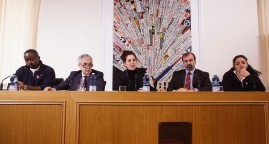Why Canada embraces Syrian refugees, while US is still wary
Prime Minister Justin Trudeau fulfilled his campaign pledge to take in 25,000 Syrian refugees, in contrast with the US. Behind the welcome is a national ethic of welcoming the victims of the world’s conflicts – and the tragic fate of a toddler.
On a chilly Canadian night in December, the country’s new prime minister, Justin Trudeau, greeted the first planeload of Syrian refugees to reach Canadian soil under his open-armed refugee policy with handshakes, hugs, and warm puffy coats.
“You are safe at home now,” a beaming Mr. Trudeau told the deplaning Syrian families.
Trudeau’s welcome party at the Toronto airport that night reflected a campaign pledge he’d made in the fall campaign to open Canada to up to 25,000 Syrian refugees within months – and to double that to 50,000 by the end of 2016.
But behind that campaign pledge was something deeper, a national ethic and tradition of welcoming the victims of the world’s conflicts that contrasted sharply with the much more modest goals and contradictory – and even vociferously negative – responses to Syrian refugees in the United States.
When Trudeau visits the White House Thursday on a state visit, President Obama might want to ask him why Canada was able to meet Trudeau’s target of greeting 25,000 Syria refugees in just two months – when Mr. Obama’s comparatively diminutive pledge to take in 10,000 Syrian refugees this year (US population: 10 times that of Canada) was met with a chorus of outrage from largely Republican governors and anti-immigration groups.
“I’d really say it’s in our national DNA to stand up and respond to these situations of upheaval and humanitarian crisis around the world,” says Louisa Taylor, director of Refugee 613, a grassroots coalition of individuals and nongovernmental organizations advocating refugee resettlement in Ottawa (area code 613, thus the name).“We see ourselves as a nation of immigrants, we can empathize with people in these situations,” she adds. “It’s also important that we’ve responded to these refugee crises for a long time, going back at least to the Vietnamese in the ’70s, so Canadians tend to say, ‘We can do this, we’ve done this before many times.”
Read the full article on The Christian Science Monitor website
Related Articles
UNHCR welcomes commitments made today at the Paris meeting on migration and asylum
08/28/2017. Statement by Filippo Grandi, UN High Commissioner for Refugees on the Paris meeting
Italian Relief Corps’ New Syrian Refugee Rescue Mission in the Aegean presented to the Press
02/18/2016. The mission patrols the sea separating Greece from Turkey. The medical staff have saved over 600 human lives in less than two months.
IOM, EU Strengthen Ties on Global Migration at Senior Officials Meeting
03/10/2017. “The EU and IOM share the view that no country can effectively address migration alone” William Lacy Swing






